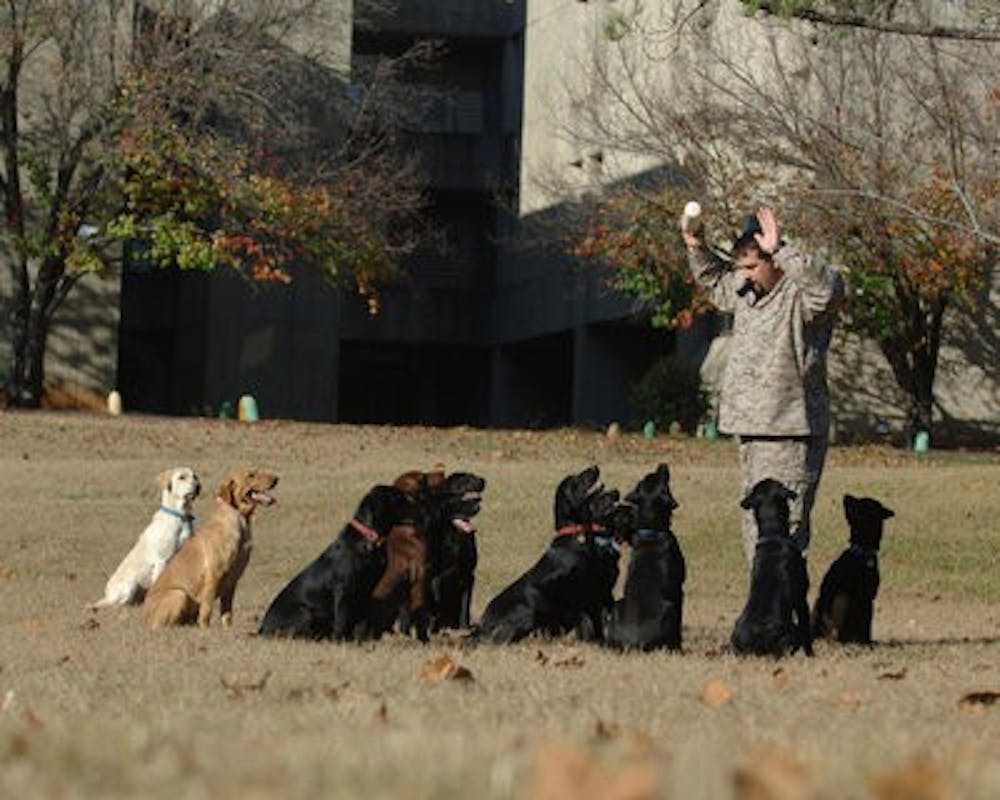McGruffs they may not be, but life-saving, terrorist-preventing dogs they are.
Craig Angle, associate director of Veterinary Sports Medicine, works with two Auburn students and a professional staff of more than 30 for the Animal Health and Performance Program at the College of Veterinary Medicine, researching and developing ways of training detection dogs that are used for various reasons all over the world.
"Auburn has a rich history in detection dogs," Angle said. "The interest in understanding their possibilities has intensified in the last 20 years."
Three programs work under the AHPP to research and train the dogs: K-9 Detection Training, K-9 Detection Research Institute and Veterinary Sports Medicine.
"It's a great program," said Tara Lanier, of the communications and marketing department of the College of Veterinary Medicine. "No other research in the world compares to it."
Auburn has been working for many years to fine tune the techniques used for training.
"They are very complicated systems and programs," Angle said. "People think you just teach a dog to smell an odor, but so much more goes into it."
Not just any dog can be taken off the street and trained to do the jobs the vet school dogs are doing, so the program breeds its own dogs to ensure successful training.
Angle said their goal is to continue researching the limits of dogs because no one has really studied it.
"They have studied nutrition and endurance,"
Angle said. "But not much has been done in terms of researching the physiological, physical, psychological and environmental perspectives."
The detection dogs have many jobs around the world, including finding narcotics, tracking people, detecting mold in homes, hunting and many other uses.
Some dogs, like the hunting dogs, can operate alone.
They can be away from their trainers and still be doing their jobs.
"They're motivated," Angle said. "And not only that, but they love it."
Auburn's dogs are working in Iraq and Afghanistan to detect Improvised Explosive Devices. IEDs are the No. 1 killer of civilians and soldiers of the conflict in the Middle East.
The dogs are trained by applying the methods and research discovered by the Auburn programs.
"We have multiple classes of clients," Angle said. "Mostly federal and government organizations."
Other clients of the training programs are Amtrak, the nation's capital, local police and federal protective services.
The Auburn dogs work events all over the world.
"Our Vapor wake dogs were used at the presidential inauguration," Angle said. "Vapor dogs are a type of detection dog that learn to smell vapors off a person carrying explosive devices when they walk by as opposed to smelling a bomb directly."
The dogs were developed at Auburn and the program is seeking a patent for them.
"I have heard that dogs who pass through that program are allowed to ride with their guardians on planes," said Joanne Tong, English professor. "That is quite an incentive to learn more about it."
Do you like this story? The Plainsman doesn't accept money from tuition or student fees, and we don't charge a subscription fee. But you can donate to support The Plainsman.




